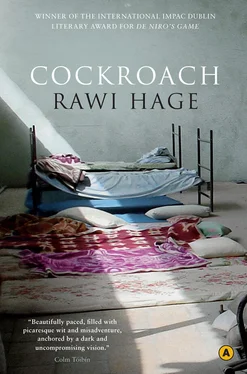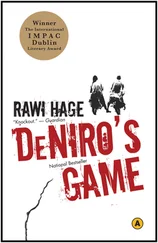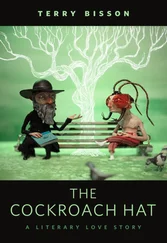It was getting cold. Shohreh suggested we make a fire and stay inside the cabin for a while. But nature horrifies me and open spaces make me feel vulnerable. I wanted to leave and go back to the city before night came and the deer howled, and the wolves twittered, and the bears danced, and the moose and the beaver wrestled down by the river, and the trees bent down to watch me sleep. And what if early in the morning birds came and laid their giant claws on me, held me to the ground and dug their beaks into my chest and tore my flesh, threw me on my back and devoured me alive, with my feet dancing in the air under their big, monstrous eyes.
I need to go back, I told Shohreh.
Too soon, she said. Let’s stay a little longer. See how quiet it is? Smell the forest. Look, look there are birds in the sky.
I looked up and saw two black dots suspended in the air, floating under a blue sea. I rushed into the car and made sure all the windows and doors were locked. Shohreh stood there, her hand to her forehead, looking at the sky and squinting. Then she walked in circles and smiled, and I watched her through the glass, turning and dancing in worship of it all.
BACK IN THE CITY, Friday afternoon, I waited across the street from the Artista Café. I smoked and paced, and when the professor stepped out I followed him. I caught up with him and held his elbow. When he saw me, he liberated his arm and stepped back, but before he could run or yell for help, I said to him: I just want to talk to you. No harm, everything is cool. I just want to talk.
I am busy, he said, and started to walk away.
I followed him, pulled out one of the stolen love letters, and started to read it.
He turned with his eyes open wide, and shouted, Where did you get that?
Let’s talk, I said. I need to talk to you.
Give me back that letter, he said, defiant. He looked ready for a fight.
His reaction surprised me. You are not going to fight with me, professor, I said. You are a little too old for that.
Un fou, t’es malade, mon ami, un homme malade , he replied, and he started to raise his voice again.
I just want to talk to you.
I will call the police if you follow me, he said, and he held his leather briefcase in his fist, ready to swing it at me.
I do not understand, I said, why you let her do this to you. She does not care about you. She only talks about herself in these letters. And why do you lie to us? You do not teach or work as a consultant. You are on welfare. Why do you deny it? Tell me, please, what is wrong with being poor and in need?
The professor snatched the letter from my hand and started to walk away fast, and like a madman he shouted, Police, police, un fou, un fou.
And that was the last glimpse I had of the lost exile in his long, pitiful coat, his stolen case swinging and rubbing against one of its large pockets. He looked like a goner, a little lost imposter, a lonely spy walking out into the cold of the world.
I walked home, taking a left turn on Prince-Arthur Street. Some restaurants had ventured to put tables and chairs outside. It was a sunny day, and if you wore a light jacket you could safely sit and have a drink and a smoke outside and look at all the young women eager to reveal their summer legs, uncover their shoulders for the sun, and walk without fear on the last few batches of slippery ice, through the noisy slush and the shivery cold. I decided to sit and have a coffee and smoke.
I chose the patio of a café that was marked off by ropes dangling from one pole to the next. I lifted the collar of my jacket, lit a cigarette, and waited for the waitress to come. I blew smoke in the air and listened to the sounds of female shoes clacking along the street. The sun hit me in the face, and I wondered what had happened to those days when all I had wanted was to escape the sun. Now the sun did not seem that bad. I recalled a choice passage from one of the professor’s letters: the morning his lady woke up early and walked with a towel to the sandy beach and noticed the birds. I wondered if people like that, always in a daze about beauty and sensuality, ever masturbate. What would their fantasies be like? Would they imagine a soft, handsome gentleman who walked around surrounded by flowers and floating smiles and deep and gentle voices? Were the colours more vivid in their dreams, the air just the right temperature, the towel and the sand the epitome of softness and delight? And yes, the songs they heard would all be good songs about mild suffering of the heart, nothing really tragic. I thought about how fantasies like that should rightly belong to poor girls with violent fathers and crazy mothers, but instead they were in the possession of the rich, the complacent, those who aspired to the old days of aristocracy and to chambermaids, swooning, and ballroom dancing.
Filth! I thought. I could shoot them all. I have a good aim. I never miss a shot. I could enter the professor’s lover’s dream and kill all those pretty boys, those older, sophisticated men with silk scarves around their necks. I could change the background music, halt the soft lapping of the ocean, shoot all the seabirds, and pull the towel from under sleeping swimsuits. I could also bring the professor with me and change him — make him look better and talk with arrogance, and give him better shoes, and lose his glasses and loosen his tie, and give him un regard so that he would always seem pensive, romantic, and suave, and of course rich. Then maybe that lover of his would be more attentive and loving to the old man.
THAT EVENING AT THE RESTAURANT, I knew that the man who had tortured my lover was about to arrive. The owner was looking nervous, and the cook pulled out his long knife to cut the good kind of lamb, and the waiter waited at the window.
Suddenly I remembered how, after my sister’s death, I had avoided windows. I remembered sitting in the dark for days, stretching and measuring the length of my beard, inviting fleas and other little creatures to invade my hair and feed on my dirty skin. I found darkness in my bathroom and a cradle in my bathtub. I wept until I heard echoes in the drain, like the fluttering of sails, telling me to leave. I shaved and then I sailed away from that room, that house, that land, thinking that all was past, all was buried, all would come to an end.
Now I walked over to Sehar and asked her if she needed bubble gum and gave her a small wink. Yes, she said, go. I will tell my father that I sent you.
I walked across the street to the depanneur and called Shohreh.
It seems like the man is coming tonight, I said.
She asked me if the girl was there. Then she said, I will be there in half an hour.
Shaheed entered with his bodyguard, and the owner rushed to meet him. Everyone got busy. After half an hour I went to the basement, opened the back door to the alley, and put a piece of wood against the frame to keep the door from closing behind me. I opened the lid of the dumpster just outside the building and perched at the edge of the big green metal bin. I had never looked inside it before. I balanced my feet on the rim, and somehow the old smells, the gooey liquid that stained the bin inside and out, felt familiar, a déjà vu of old smells and dark landscapes, like the abstract pattern inside small coffee cups after the black liquid has been sucked down the abyss of tongue and throat. And I suddenly remembered every slice of vegetable that I had swept, that I had carried in garbage bags and thrown over the rim and inside that green metal bin. And when I looked behind me at the ground, the stained ground, I felt like I was high up, hanging from a tree or on the edge of a cliff, balancing with two extended arms. I almost forgot why I had come here in the first place.
Then I remembered. I searched for the bag that my lover had left me, and soon I found it. The gun was inside a white plastic bag, wrapped in many folds. I looked down towards the end of the alley and saw Majeed’s taxi across the street, its signal light blinking like fear.
Читать дальше












